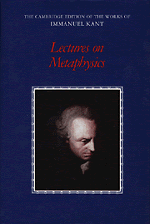Book contents
- Frontmatter
- Contents
- General editors' preface
- Acknowledgments
- Translators' introduction
- Guide to abbreviations and the translators' notes
- I Metaphysik Herder, 1762–1764 (selections) (Ak. 28: 39–53)
- II Metaphysik L1, mid-1770s (complete except for the Natural Theology and Heinze extracts) (Ak. 28: 195–301)
- III Metaphysik Mrongovius, 1782–1783 (complete) (Ak. 29: 747–940)
- IV Metaphysik Volckmann, 1784–1785 (selections) (Ak. 28: 440–450)
- V Metaphysik L2, 1790–1791? (complete except for the Natural Theology) (Ak. 28: 531–594)
- VI Metaphysik Dohna, 1792–1793 (selections) (Ak. 28: 656–690)
- VII Metaphysik K2, early 1790s (selections) (Ak. 28: 753–775)
- VIII Metaphysik Vigilantius (K3), 1794–1795 (complete) (Ak. 29: 943–1040)
- English-German glossary
- German-English glossary
- Latin-German equivalents occurring in the text
- Concordance of Baumgarten's Metaphysics and Kant's Metaphysics lectures
- Explanatory notes (with bibliography of Kant's works cited)
- Name Index
- Subject index
V - Metaphysik L2, 1790–1791? (complete except for the Natural Theology) (Ak. 28: 531–594)
Published online by Cambridge University Press: 05 May 2013
- Frontmatter
- Contents
- General editors' preface
- Acknowledgments
- Translators' introduction
- Guide to abbreviations and the translators' notes
- I Metaphysik Herder, 1762–1764 (selections) (Ak. 28: 39–53)
- II Metaphysik L1, mid-1770s (complete except for the Natural Theology and Heinze extracts) (Ak. 28: 195–301)
- III Metaphysik Mrongovius, 1782–1783 (complete) (Ak. 29: 747–940)
- IV Metaphysik Volckmann, 1784–1785 (selections) (Ak. 28: 440–450)
- V Metaphysik L2, 1790–1791? (complete except for the Natural Theology) (Ak. 28: 531–594)
- VI Metaphysik Dohna, 1792–1793 (selections) (Ak. 28: 656–690)
- VII Metaphysik K2, early 1790s (selections) (Ak. 28: 753–775)
- VIII Metaphysik Vigilantius (K3), 1794–1795 (complete) (Ak. 29: 943–1040)
- English-German glossary
- German-English glossary
- Latin-German equivalents occurring in the text
- Concordance of Baumgarten's Metaphysics and Kant's Metaphysics lectures
- Explanatory notes (with bibliography of Kant's works cited)
- Name Index
- Subject index
Summary
Introduction [Logic]
ON PHILOSOPHY IN GENERAL
All human cognitions are, according to form, of a twofold kind: (i) historical, which are from things given <ex datis>, taken merely from experience; and (2) rational cognitions, which are from principles <exprincipiis>, taken from certain principles. The rational cognitions are again: (1) philosophical, cognitions from concepts, and (2) mathematical, from the construction of concepts. One can distinguish cognitions according to their objective origin, i.e., according to the sources from which alone a cognition is possible; and according to the subjective origin, i.e., according to the manner in which cognition can be acquired by a human being. With respect to the former, cognitions are either rational or empirical, with respect to the latter, rational or historical; in itself the cognition may have come about however it will. – The system of rational cognition through concepts would thus be philosophy. But first we must consider the cognitions themselves, and then the system of them. – Because mathematics and philosophy agree in that they are rational cognitions, we must first define rational cognitions. The rational cognitions are opposed to the historical ones. The historical ones are derived from things given <ex datis>, and the rational cognitions from principles <ex principiis>, as we have already indicated above. The first, namely, the historical, are cognitions which are possible only insofar as they are given.
- Type
- Chapter
- Information
- Lectures on Metaphysics , pp. 297 - 354Publisher: Cambridge University PressPrint publication year: 1997

